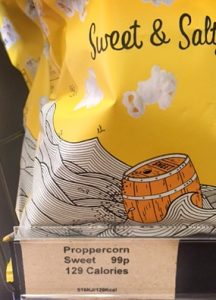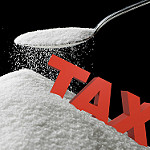What is the potential impact of calorie labelling in worksite cafeterias? A pilot study
 Reducing excess consumption of food and drink is core to tackling the high prevalence of overweight and obesity in the UK and elsewhere. In this paper we provide the results of a pilot trial estimating the potential impact of calorie labelling on energy purchased across six worksite cafeterias. Post-intervention feedback amongst cafeteria patrons and worksite managers and caterers suggested high levels of acceptability. The predicted effect of labelling to reduce energy purchased was only evident at one out of six sites studied.
Reducing excess consumption of food and drink is core to tackling the high prevalence of overweight and obesity in the UK and elsewhere. In this paper we provide the results of a pilot trial estimating the potential impact of calorie labelling on energy purchased across six worksite cafeterias. Post-intervention feedback amongst cafeteria patrons and worksite managers and caterers suggested high levels of acceptability. The predicted effect of labelling to reduce energy purchased was only evident at one out of six sites studied.
Impact of calorie labelling in worksite cafeterias: a stepped wedge randomised controlled pilot trial. Vasiljevic M, Cartwright E, Pilling M, Lee M-M, Bignardi G, Pechey R, Hollands GJ, Jebb SA, Marteau TM, 2018
Would taxing sweet snacks bring greater health benefits than taxing sugar-sweetened drinks?
 The UK Government levy on sugary drink producers started in April 2018. Our study looks at whether increasing the price of sweet snacks would be as effective.
The UK Government levy on sugary drink producers started in April 2018. Our study looks at whether increasing the price of sweet snacks would be as effective.
We found that a 10% increase in the price of sweet snacks could lead to a similar reduction in consumer demand as the same price increase for sugar-sweetened drinks.
However, such a price increase is estimated to have knock-on effects that may further reduce purchases of sugar-sweetened drinks and other snacks.
Furthermore, as sweet snacks provide twice as much sugar in the diet as sugar-sweetened drinks, the overall reduction on sugar intake could be even greater than that observed with price increases for sugar-sweetened drinks.
Are sweet snacks more sensitive to price increases than sugar-sweetened beverages: analysis of British food purchase data. Smith, Cornelsen, Quirmbach, Jebb, Marteau, 2018.
[altmetric doi="10.1136/bmjopen-2017-019788" float="left" popover="left" style="box-shadow: 0 1px 4px rgba(0, 0, 0, 0.2);" class="someclass" type="1"]